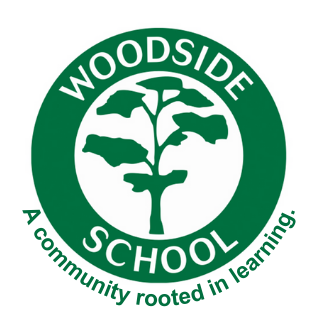Physical Education
At Woodside we recognise the importance of Physical Education and the role it has to play in promoting long term, healthy lifestyles.
We believe that the physical aspect is only one part of Physical Education, coupled with the cognitive, social and well-being skills received throughout lessons. This ensures children are well prepared for the life-long sporting journeys.
The programme of study outlines seven areas that all children should be involved in at Key Stage Two. These are:
- Running, jumping, throwing and catching in isolation and combination
- Competitive games - indoor and outdoor
- Gymnastics
- Dance
- Athletics
- Swimming (Year 5 use Amersham Pool for weekly lessons. Year 6 will get booster sessions if they have not reached the swimming outcomes of year 5)
- Outdoor and Adventurous activities (through PE lessons, residential visits as well as Forest School initiative)
Our pupils participate in two hours of timetabled Physical Education lessons each week, covering two different sports/skills foci for each half term of learning. The school's Physical Education overview sets out what is to be taught in each year group. Our Progression of Skills document sets out a clear progression of skills expected from our pupils. Physical activity is also embedded during the school day through initiatives such as The Daily Mile.
We are part of the Dr Challoner's High School Sports Partnership. This allows us access to more competitive organised sport competitions against other schools in the partnership.
Intent
At Woodside, we understand that high-quality physical education curriculum is an entitlement for all pupils, regardless of their starting points or their prior experiences of sport and physical activity. We, therefore, strive to create a culture, which aims to inspire an active generation to enjoy PE, encourage each other and achieve. We aim that our pupils understand that healthy and active lifestyle choices will contribute to their overall mental well -being. At our school, we provide a safe and supportive environment for children to flourish in a range of different physical activities, which is essential in supporting their physical, emotional, spiritual, social, and moral development. By giving ample opportunities for pupils to be active during the school day and through extra-curricular activities, our school ensures that PE actively contributes to pupils’ personal development.
We recognise the importance of Physical Education and the role it plays in promoting long term, healthy lifestyles. The intent of our curriculum is to provide all children with high quality Physical Education and sport provision. We strive to inspire our pupils through fun and engaging Physical Education lessons that are enjoyable, challenging, and accessible to all.
We believe that the physical aspect is only one part of Physical Education, coupled with the cognitive, social and well-being skills received throughout lessons. Our pupils have opportunities to be successful physically, cognitively, socially, and emotionally. Our intent is that pupils become more physically active and skilled, but we also celebrate and develop skills such as determination, resilience, cooperation and teamwork. Following the national lockdowns, we were committed to improving the fitness and stamina of our pupils as this was a national goal, but today we continue to be committed to this aim.
We use ‘Complete Physical Education’ scheme to teach our Physical Education curriculum. We have carefully selected units to ensure our pupils have access to a broad and balanced curriculum, with opportunities to engage in many physical activities and sports. The curriculum is designed and sequence to ensure that our pupils know more and can do more. It focuses on motor competences, strategies and tactics as well as healthy participation -as the three pillars of progression in the teaching and learning of Physical Education. Long-term planning has been mapped out for each year group, setting out the curriculum to be taught throughout the year. Our lessons have been closely referenced against the 2014 National Curriculum as well as the Woodside knowledge and skills to ensure progression and coverage.
Our Physical Education scheme ensures that our pupils access the high quality instruction, practice, and feedback to practice and develop their overall motor competence. This includes locomotor skills (running, jumping), stability skills (twisting, balancing) and manipulation skills (throwing, catching). Progression in Fundamental Movement Skills (FMS) from simple to complex movement patterns, once the former has been secured, is vital in knowledge progression as well as application. Once secure, FMS form the building blocks for more advanced movement skills, which will be relied on for participation in a variety of physical activities. Our curriculum develops, refines, and practices FMS in increasingly complex situations and provides our pupils with appropriate activities to develop their movement skills.
Complete Physical Education scheme ensures that our pupils are aware and know specific rules, strategies, and tactics relating to games taught. This will involve, for example, learning about tactics associated with game-based activities, such as basketball, football, or dodgeball. There are shared tactics between similar types of games, for example attack and defence within invasion games.
Our curriculum aims to teach our pupils the importance healthy and active lives and strives to ensure that pupils make informed decisions about their own healthy participation. We aim for our pupils to understand connection between physical activities and health.
Our staff consider the most appropriate vocabulary and definitions to use when teaching and ensure that pupils understand and use the key terminology within lessons and are taught precise meaning within each lesson context.
Our teachers recognise that learning takes time. They ensure that pupils have enough time to practise, revisit and develop their knowledge and skills within a context before moving too quickly on to a new sport or physical activity. Moving pupils too quickly into new contexts can reduce pupils’ competence, as they attempt to meet the new contextual demands without adequately having secured the steps required to demonstrate success in one context. Complete Physical Education scheme ensures that our curriculum is sequenced, therefore progression occurs as pupils participate in different physical activities that require them to recall prior knowledge and apply in a different context. This means that our pupils secure prerequisite knowledge before moving on to more complex one and therefore, building on key fundamental movement skills before introducing additional complexity. Our PE curriculum meets the needs of all pupils, where all pupils feel included and able to succeed within the subject. This includes pupils with Special Educational Needs and Disabilities. Our most able pupils (within this subject) have opportunities to participate in a variety of sporting competitions. Physical education is a key part of our school life, and we fully intend for Physical Education, School Sport and Physical Activity (PESSPA) to play a key role in and make a difference to the lives of our young people.
Implementation
At our school, we understand the importance of creating a supportive environment, where all pupils can achieve, regardless of ability. The instruction, practise, and feedback that pupils receive within lesson time enables all pupils to develop their competency. Within lessons, our pupils receive clear directions with careful step-by-step instruction, practise, and feedback to develop their knowledge and skills. Our teachers aim to provide examples of how knowledge is applied in context of a specific game and through demonstrations, all pupils can develop a clear picture of what success looks like and focus on working towards it. Small step-by-step instructions are underpinned by ensuring that pupils have adequate time to practise before additional content is introduced. Staff use encouragement and praise and give pupils feedback (where appropriate) that focuses on what they are doing well and how to develop further.
Our pupils participate in two hours of timetabled PE lessons each week, covering two different sports/skills focuses each half-term. Lessons always begin with a warm-up. Pupils understand the importance of warming up, as well as the effects it has on our bodies. We endeavour to include technical vocabulary when stretching, to expose pupils to the names of muscles. Key vocabulary is taught in all lessons so by the end of Year 6, pupils have a rich vocabulary related to sports, health and fitness. Teachers will often use videos at the start of a lesson to introduce the new learning, show pupils the sport ‘in action’ or highlight a particular skill, for example videos showing the start of a sprint, or a serve in badminton. During this time, teachers will also re-cap prior learning and introduce new learning.
Physical activity is embedded throughout the school day via initiatives such as The Daily Mile. Active travel to school is encouraged, as well as active break times with a variety of sporting equipment to use. Each year, two class representatives are nominated to be part of Sports’ Crew and assist the House Captains and PE Lead to develop our work as an active school. Meetings take place each half-term, where strategy is discussed.
Year 5 use the Amersham swimming pool for weekly swimming lessons at various stages of the academic year and Year 6 pupils receive booster sessions - if they have not reached the swimming outcomes by the end of year 5.
All children are encouraged to participate in the varied range of extra-curricular activities. Responding to pupil voice, we provide inclusive and enjoyable clubs, which increases children’s physical activity. Some sports clubs at Woodside include Boys’ football, Girls’ football, football (First Touch), Cross Country, Athletics (Kudos), Netball (outside agency), Taekwondo (outside agency) and Mini tennis.
Finally, we enrich the PE curriculum by organising whole school events with outside visitors, for example Dan the Skipping Man, Kidzfit and a Growth Mindset BMX workshop. We belong to the School Sports Partnership, and we aim to stimulate greater team spirit by participating in a variety of inter-school matches, tournaments, and festivals. Our pupils get the opportunity to develop their skills at these events, as well as take part in competitive tournaments. Examples of these curriculum enrichment mornings include bench ball, circuits, tennis, rugby, a dance festival, cross-country, tri-golf, Ultimate Frisbee, handball, dodgeball, fitness, and games. All extra-curricular provision and sport that occur within our school complements and enriches our curriculum offer for all.
Impact
At Woodside, we ensure that our PE curriculum is progressive and allows all pupils to develop fundamental skills and apply them to a variety of sports and activities. Our skills progression enables teachers to plan to cover all aspects of the PE curriculum to the highest level. All pupils are provided with the necessary skills and given opportunities to demonstrate improvement to achieve their personal best. Our pupils are physically active, and this has a positive impact on their learning in the classroom.
Through regular sporting events, our pupils understand good levels of positive behaviour such as, fair play, respect, and teamwork. Alongside this, we share sporting achievements at all levels, in our assemblies, newsletters and on Twitter.
Children leave at the end of Year 6 having had exposure to a wide range of sports. Physical education is a key part of our school life and a combination of our physical education, school sport and physical activity makes a difference to the lives of our young people. They leave us with the fundamental movement skills that allow them to excel in the future and be prepared for their life-long sporting journeys - a good understanding of the importance of health and fitness; the ability to take part in competitive games; a love of PE; and fundamental skills such as resilience, cooperation, determination, communication, cooperation, problem solving, self-discipline, reflection, evaluation and integrity- crucial to their overall personal development.

